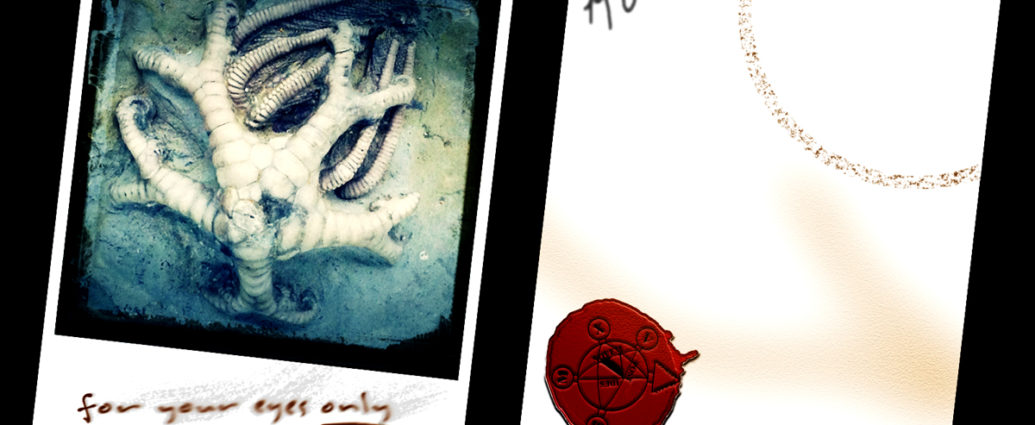Zoso Language Kit
Zoso (’zoh soh’) is the fictional, alien language of The Endless Whispers universe. Over 30,000 years old, it is spoken by the Haethonite heretics amongst themselves as well as with their god known simply as the “Devourer” or Azura’than). In short, it is an ugly language belonging to a vile, hate-filled people.
From a movie-making PoV: Zoso is pure gibberish. However, it is structured gibberish, which is very important. By giving it an identifiable structure (even if it’s only registered subconsciously), the audience will be able to suspend their disbelief all the more easily. For example, see the fake languages used in Star Trek (Klingon), Game of Thrones (Dothraki), and The Lord of the Rings (Elvish).
For the sake of simplicity and the sanity of the actors who have to speak Zoso, the grammar is (mostly) a direct 1:1 correspondence with English. (Verb tenses are the exception.)
Lexicon
The following is the very basic Zoso language rules and vocabulary as it appears in the movie.
Tenses
Past Tense: Place ‘ia at the end of a word.
Present Tense: Do nothing.
Future Tense: Place ‘oth at the end of a word.
Conditional: Place a’ at the front of a word.
Verb Agreement
Verbs do not agree with either subject or object.
Nouns
Plural: Add la at the end of the word.
Possessive: Add ‘wai at the end of the word.
Special Exceptions
For the sake of ‘cultural’ flavor, special exceptions are allowed to the Zoso language. These are up to the person inventing said exceptions, and hopefully there is a modicum of backstory tied to why the exception exists. Special exceptions can violate all the rules of the language.
One Who Does
A Noun that performs a Verb: add ’than to the end of the verb. For example, a (wood) cutter is the verb To Cut + ‘than, or skrav’than (also known as a carpenter). Or, similarly, one who devours becomes Azura’than, from the verb To Devour (azura).
Abnormal Words
Class-specific Words: Some verbs only apply to specific classes, and so therefore exist in multiple forms. The verb ‘To Cut’, for instance, has four forms based on class: Nature Matter (trees, plants, moss, etc.), Elemental Matter (rocks, ice, etc.), Living Creatures (humans, deer, dogs, etc.), and Human Souls.
English-to-Azurathan
A: Ai
Against: Il
All: Wayun
And: Han
Anew: Jujuri (same as new)
Are / To be / To exist: Gotha
Arm: Fah (singular), Fahla (plural)
Ash: Zas (singular), Zasla (plural)
As with: Daloh
Awaken: Kronol
Bad (Unfortunate): Guggorn
Begin: Yaihai
Before: Dira (preposition)
Belong: Rugom
Between: Vut
Bone: Nogath
Bosom: Risoli (singular / plural)
Bow (1): Kadishu (verb)
But (1): Taz (conjunction)
But (2): Tozok (preposition)
Butcher: Sazog’zu
By: Orm (preposition)
Can / Be able to: Athag
Child: Pith (singular), Pithla (plural)
Chaotic: Shugg
Chosen: Vug (adjective), Vugdu (noun)
Choose: Vugul (verb, to choose)
Consume: Az
Come: Lai
Comprehend: Mnahn (same as understand)
Cower: Kadishisha
Creature: Sog (singular), Sogla (plural)
Crush: Damzuk (verb)
Cut: Skrav (special exception, verb) (applies only to nature matter)
Cut: Skreez (special exception, verb) (applies only to elemental matter)
Cut: Skrosh (special exception, verb) (applies only to living creatures)
Cut: Skaal (special exception, verb) (applies only to human souls)
Dead (1): Mordu (adjective)
Dead (2): Morghul (noun)
Deathless: Morhan
Destroy: Ilksadum (verb)
Devour: Azura
Devourer: Azura’than (One who Consumes)
Do / To do: Ulu (verb)
Down: Ka
Drift: Uhoon
Dust: Naflan
Earth: Pagh
Everlasting: Graal
Eternal: Sangraal
Everyone: Doha
Eye: Tei (singular), Teila (plural)
Face: Nak (singular), Nakla (plural)
Fear: Shugfa (singular/plural), Shughaifa (verb)
Feast (1): Opaz (singular noun), Opazla (plural)
Find: Logosh
First Zugh
Flesh: Sogoth
Fodder: Glorghol
For: Vra’ (prefix)
Foretell: Jreshkan
Forsake: Tyurvok
Friend: Ummagga (singular), Ummaggala (plural)
Gather: Chonos
Galactic: Chthukor
Get Out: Rilnos (to leave)
Gladly: Um’um (adverb)
Gnat: Slizzik (singular), Slizzikla (plural)
Grind: Logoth
He / Him: Yat / Yatal
His: Yat’wai (see Possessive, above)
Head: Toh (singular), Tohla (plural)
Heresy: Fnagath (singular), Fnagathla (plural)
Human: Fek (singular), Fekla (plural)
I (Me) / My: Ya / Yad
Individual Zu’kush (related to numeric ‘1’)
Impudent: Kushkor
Insolent: Kuvral
In / Into: Vru’ (prefix)
In the name of: Hu’pagh
Irrelevant: Pidipi
Is / To be / To exist: Gotha
Kill: Sazog
King: Krako
Kingdom: Krako’hod
Know: Mnad
Lie: Fal (singluar), Falla (plural)
Longer: Nemani
Maddening: Uhulu
Maggot: Sligghol (singular), Sligghola (plural)
Matter: Ordos (verb)
Mote: Naf (singlular), Nafla (plural)
No / Not: Vek
Nothing: Byaki
Now: Yeta
Of: Da’ (before consonant or ‘y’) or Dal’ (before vowel) (prefix)
Offensive: Hupagh
On: An’ (prefix)
One: Zu
Possibly: Thoda
Press: Kyar (verb)
Prophet: Jreshkahal
Rest: Drathun (noun, same as others)
Right (1): Sra’ (‘most complete extent’, prepositional phrase, prefix)
She / Her: Yaho / Yahuri
Slaughter: Sazog’sadum (verb)
Soon: Badam
Soul: Iziz (singular), Izizla (plural)
Star: Kor
Stop: Ezrak
Submit: Golhol
Subsume: Sibilk
Surrender: Shoggshila
That: Duil
The: Dui
They (Them) / Theirs: Yatey / Yatar
This: Duin
To: Vru’ (prefix)
Touch: Ptah
Torment: Ooroos
Unbeliever: Haethos (singular), Haethosla (plural)
Understand: Mnahn
Unspeakable: Ai’kog
Unworthy: Slithyogg
Very: Gohai
Vessel: Thrud (noun meaning ‘container’)
Wait: Hratha
We (Us) / Our: Yaz / Yazil
Will (1): Oth (modal verb, see above)
Will (2): Zkraziki (noun)
Wind: Fwoon
Worm: Slith (singular), Slithla (plural)
Yet: ilith
You / Your: Do / Dok

